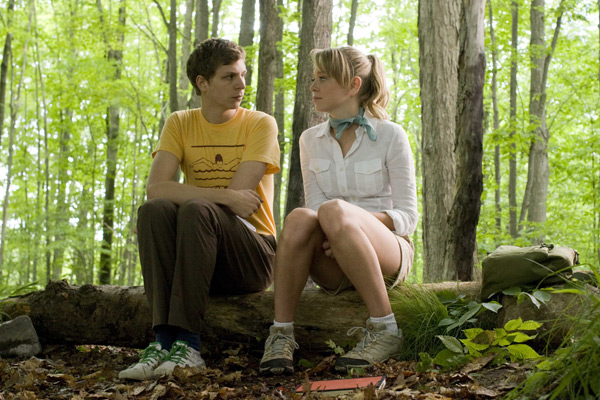
It is my belief that Nick Twisp, the lead character in C.D. Payne’s riotous Youth in Revolt, is not unlike the Copperfield character of the Dickensian era. In spite of all the Twisp-driven manic episodes dealing with his cross-dressing Carlitta persona, both stories deliver – as promised by their mass – on the poignancy of youth against the exhausted territories of age and experience. I used to think I was alone in this fantasy world of Copperfield-turned-Twisp make believe – despite the similarities inherit in both books – but it seems Miguel Arteta (the director previously behind Chuck & Buck and The Good Girl) and screenwriter Gustin Nash (who does a fine job cramming Payne’s 500 paged book into an engaging matinee-length romp) are cruising through this fantasy world with me with their adaptation of Youth in Revolt.
Michael Cera, in what is by far his finest performance yet of his famous one-note socially awkward character he initiated with Arrested Development, plays the imaginative Nick Twisp, an unusual teen who loves to live inside his head - especially when it comes to dealing with women. He’s too smart for his own good to stay out of trouble and way too smart to deal with his inept Mom (Jean Smart) and his recently-dumped father (Steve Buscemi). Adding to the list of those lacking intelligence in Twisp’s life is his mother’s live-in boyfriend (Zack Galifianakis), who has his own charming run-ins with the law. It is while vacationing in a trailer park (described as a cabin by the woods by Galifianakis’ character) that Twisp meets Sheeni Saunders (the up-and-coming Portia Doubleday) and falls madly in love with her charming rebel yell (the product of a strict religious upbringing), her coolly France-obsessed mind, and her knowledge of hip books and cool movies. Even though she has a boyfriend, Twisp finds himself falling for her and the two become fast friends. When Twisp is forcibly returned to Oakland by his mother and then discovers that Sheeni has been put in a private school, he invents an alter-ego, the cigarette-smoking Francois Dillinger, to help him recover his love, fight off her all-American boyfriend, and join her in reform school; it’s a character (and a new performance for Cera) whose sole purpose is to cause Sheeni to swoon with fulfillment.
While the film is definitely chock full of chances and moments for the supporting cast (which also includes well-built comedic performances from Justin Long and the always charismatic Ray Liotta) to steal away from the main construct of the story, Arteta does a disciplined job of balancing out the performances and making the film an even-paced observation of absolute teenage awkwardness. Even if large sections of the novel are completely removed for the sake of time, Arteta manages to bring the absurdity of the story (with the help of some animated sequences by Peter Sluszka) into a sort of consciousness where satire and commentary become a visible, but nonthreatening entity for audiences to enjoy. The only true complaint I have about the adaptation is how “easy” Twisp’s relationship with Sheeni seems to unfold on-screen for audiences unfamiliar with Payne’s story; in the book their “affair” is much more of a highly-charged game of cat-and-mouse maneuvers. That being said, Youth in Revolt succeeds with daft merriment when Twisp and Dillinger – with true slapstick precision - execute their attention-grabbing yet poorly-planned adventures with all the might of the military…minus the manpower.
Despite a couple of moments that don’t translate too comfortably from book to film and an ending that seems more audience-tested and audience-approved instead of what’s best for the narrative, Youth in Revolt remains punctuated with darkly-original perspective and a rhythm to the comedic bits that is energizing and freshly organic. There’s a fierce looseness and an anarchistic spirit to the performances in Youth and Revolt that makes the film eerily reminiscent of The Hangover although I don’t expect to see the same box-office play; however, Arteta’s jaunty effort should provide enough people with genuine entertainment for a weekend night. In my estimation, the pitfalls and the pratfalls of teenage life amongst the rubble of suburbia has been a genuine cash cow for movie companies since 1973’s American Graffiti and Arteta’s adaptation of Youth in Revolt is another successful entry in this unyielding category of cinema.
|
||||||||||||||||||
Blu-ray Details:
Available on Blu-ray and DVD - June 1, 2010
Screen Formats: 1.85:1
Subtitles: English, English SDH
Audio: English: DTS-HD Master Audio 5.1
Yet another in a long line of quality releases from Sony. Its warm colors are rendered nicely and the attention to detail is abundantly satisfying. Few scenes suffer from uneven color gradations in the footage, but, overall, Youth in Revolt is a satisfying release.
Supplements:
Commentary Track: The Blu-ray is highlighted by an engaging feature-length audio commentary from Cera and Arteta; the discussions in the commentary primarily revolve around anecdotes from the film’s production. Fans will enjoy this feature more than casual observers.
Deleted Scenes:
- Nine Deleted Scenes (10:48): While the beefy book might be hindered with some heavy editing, the feature was improved with these choice cuts; nothing of much value here.
- Five Deleted and Extended Animated Sequences (7:11): Same as above, nothing much lost from the overall impact of the movie with these leftovers. Still interesting, though.
Audition Footage: very fun and interesting footage featuring Portia Doubleday (2:09), Zach Galifianakis (1:16), Erik Knudsen (2:35), Jonathan B. Wright (2:01), and Adhir Kalyan (1:20).
Also included is BD-Live functionality; Sony's MovieIQ connectivity; and 1080p trailers for A Single Man, Chloe, The Runaways, A Prophet, The Bounty Hunter, and Harry Brown.












![John Wick 1 - 4 Box Set [UK] - 4K UHD Review John Wick 1 - 4 Box Set [UK] - 4K UHD Review](/images/resized/images/stories/john-wick-lg_65_65.jpg)
















